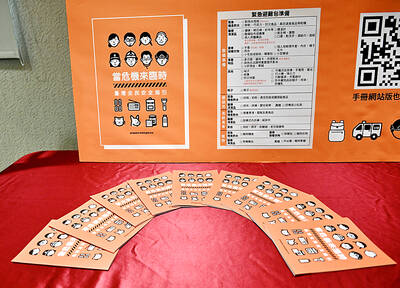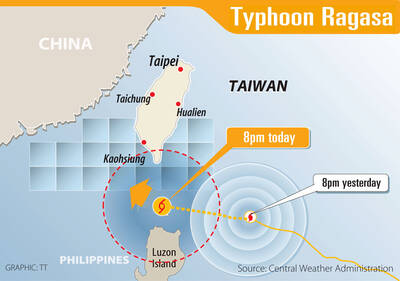China’s producer or wholesale prices last month hit a 41-month high, the government said yesterday, amid soaring global resource prices that officials fear threaten to slow the nation’s growth.
The producer price index (PPI) gained 8.1 percent last month from a year earlier, the National Bureau of Statistics said, up 0.1 percentage point from March.
This is the highest level since November 2004, when the index also stood at 8.1 percent after reaching 8.4 percent in the previous month.
In the first four months of this year, the index increased by 7.2 percent compared with a 6.9 percent rise in the first quarter, the bureau said.
Raw materials prices went up by 10.4 percent last month, while prices of crude oil rose 37.9 percent, with the prices of gasoline, kerosene and diesel up 10.8 percent, 11.7 percent and 10.2 percent respectively, it said.
Prices for food and related products grew by 11.9 percent last month.
Soaring international commodity prices, especially that of crude, and the sluggish pork production in China were part of the reasons for the sustained expansion of producer prices, economists said.
“The consistent upturn in PPI inflation at the intermediate goods level since the fourth quarter in 2007 reflects continuous upward prices for a range of global commodities, including energy resources and raw materials,” Grace Ng (吳向紅), an analyst with JP Morgan in Hong Kong, said in a research note.
Crude oil struck a new record high of around US$124 a barrel during trading in Asian hours yesterday.
“Global inflation has intensified, creating major outside pressure for China,” Chinese Vice Premier Wang Qishan (王岐山) warned yesterday at a forum in Shanghai.
Producer prices are a critical measure of economic trends, because they tend to trickle into consumer prices, which more directly affect China’s 1.3 billion consumers.
“April’s figures suggested pressure for PPI to spread into consumer prices is increasing,” Li Ruoyu, a researcher at the State Information Center, a government think tank, said.
China’s consumer price index, or CPI, the main gauge of inflation, reached 8.0 percent in the first quarter of the year, mainly driven by surging food prices.
In February, it climbed to 8.7 percent, the highest in nearly 12 years, before easing slightly to 8.3 percent in March.
The world’s fourth-largest economy expanded by 10.6 percent in the first quarter of this year compared to a year ago.

One of two tropical depressions that formed off Taiwan yesterday morning could turn into a moderate typhoon by the weekend, the Central Weather Administration (CWA) said yesterday. Tropical Depression No. 21 formed at 8am about 1,850km off the southeast coast, CWA forecaster Lee Meng-hsuan (李孟軒) said. The weather system is expected to move northwest as it builds momentum, possibly intensifying this weekend into a typhoon, which would be called Mitag, Lee said. The radius of the storm is expected to reach almost 200km, she said. It is forecast to approach the southeast of Taiwan on Monday next week and pass through the Bashi Channel

The number of Chinese spouses applying for dependent residency as well as long-term residency in Taiwan has decreased, the Mainland Affairs Council said yesterday, adding that the reduction of Chinese spouses staying or living in Taiwan is only one facet reflecting the general decrease in the number of people willing to get married in Taiwan. The number of Chinese spouses applying for dependent residency last year was 7,123, down by 2,931, or 29.15 percent, from the previous year. The same census showed that the number of Chinese spouses applying for long-term residency and receiving approval last year stood at 2,973, down 1,520,

EASING ANXIETY: The new guide includes a section encouraging people to discuss the threat of war with their children and teach them how to recognize disinformation The Ministry of National Defense’s All-Out Defense Mobilization Agency yesterday released its updated civil defense handbook, which defines the types of potential military aggression by an “enemy state” and self-protection tips in such scenarios. The agency has released three editions of the handbook since 2022, covering information from the preparation of go-bags to survival tips during natural disasters and war. Compared with the previous edition, released in 2023, the latest version has a clearer focus on wartime scenarios. It includes a section outlining six types of potential military threats Taiwan could face, including destruction of critical infrastructure and most undersea cables, resulting in

WARNING: People in coastal areas need to beware of heavy swells and strong winds, and those in mountainous areas should brace for heavy rain, the CWA said The Central Weather Administration (CWA) yesterday issued sea and land warnings for Typhoon Ragasa, forecasting that it would continue to intensify and affect the nation the most today and tomorrow. People in Hualien and Taitung counties, and mountainous areas in Yilan and Pingtung counties, should brace for damage caused by extremely heavy rain brought by the typhoon’s outer rim, as it was upgraded to a super typhoon yesterday morning, the CWA said. As of 5:30pm yesterday, the storm’s center was about 630km southeast of Oluanpi (鵝鑾鼻), Taiwan’s southernmost tip, moving northwest at 21kph, and its maximum wind speed had reached